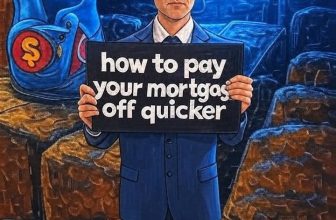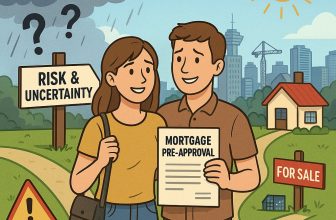(November 7, 2021)
Intro (pre-amble): up to 13:10 mark of podcast (Dealing with rising interest rates | Is affordability in Vancouver hopeless? | economic life without Alberta oil = not good)
With virtually every economic indicator calling for rate hikes, Canadian mortgage holders are left wondering how to prepare and react to the already-in-progress wave of interest rate volatility. Regardless of the degree and timing of the pending increases, concerned mortgage holders in Canada have the opportunity to control their own destiny and minimize (or even eliminate) potential risks associated with rising interest rates (i.e. higher mortgage payments).
Here are a few tips to be aware of in a rising interest rate environment:
- DONT PANIC, put things in perspective, and react accordingly. WIth all the announcements surrounding rising interest rates it is critical to understand HOW or even IF it will apply to you, and if so, to what degree. For example, on October 27 the Bank of Canada announced that they are anticipating the beginning of an upward trajectory in rate hikes. Here are some tips on how to prepare and anticipate the pending (or speculative) rate increases:
- unlike the random and spontaneous nature of fixed rate changes (they can happen at any moment without warning), Prime Rate changes operate in a more formal and orderly manner. Every year the Bank of Canada releases a schedule of their interest rate announcements for the year, there are 8 scheduled announcements. Knowing this, one is able to plan for and anticipate any pending changes as the announcements are very informative and revealing. The BOC Governor (Tiff Macklem) openly discusses the reasoning for any rate change, then also provides hints on what to expect for the following announcement
- past rate increases (or decreases) have typically been in 0.25% increments. Here is an idea of how much a few 0.25% rate hikes would impact your monthly payment on a $500,000 variable rate mortgage with a Prime-1% discount:
- $500,000 at todays prime rate of 2.45%-1% = $1,987/month
- Prime Rate increase to 2.70%-1% = $2,046/month
- Prime Rate increase to 2.95%-1% = $2,106/month
- Rate increase to 3.20%-1% = $2,166/month
- Time for a little…ADDITION by SUBTRACTION. So, for a 1% increase on a $500,000 mortgage the payment would shoot up by $2,148/year -> $179/month -> $5.77/day. No need to worry though…by using the powerful concept of addition by subtraction, we can win back the $5.77 budgetary spike by eliminating (or modifying) a daily routine…like replacing the costly Starbucks routine (this probably ranges anywhere from $3-$15 for most people). So ya, maybe switch to Tim Hortons when interest rates go up, or maybe eliminate the entire experience of walking into a retail establishment to purchase your daily cup (or 2) of java and replace it with a good old home brew and travel mug routine…boom! …you’re now back in the black and your monthly budget has come back down as though your interest rate hasn’t even changed (and for some, the budget has flattened even more depending on the frequency and degree of your daily Starbucks routine). Put things in perspective, and react accordingly. Long live ADDITION by SUBTRACTION!
- There are options, CONSIDER THEM. Expand your decision making process and consider other mortgage products. Most Canadians revert to a competitive 5 year fixed mortgage term and fewer opt for a variable rate mortgage. But look beyond these products, ask your broker for more options and suggestions. Brokers (as opposed to bankers) will have a broad range of products compared to a one-trick-pony resource like bank representatives. There are several mortgage products that handle rate increases better than others, here are a few to consider:
- CAPPED variable rate mortgages: Many people are simply not aware that there are variable rate mortgages available that feature a fixed payment. Rather than a fluctuating monthly payment, these mortgages simply adjust the interest component within your payment to reflect the increase in prime rate. For example if your monthly mortgage payment is $1,800 and prime rate increases by 0.25%, rather than increasing your $1,800 mortgage payment, the interest portion within the $1800 payment will internally adjust…so instead of allocating $500 of the $1,800 mortgage payment to interest, it would simply maintain the monthly payment at $1,800, but increase the internal interest component to $600.
- Hybrid Mortgages: these mortgages allow you to compartmentalize your mortgage with different products. For example, let’s say your mortgage balance is $500,000. Instead of signing for a 5 year fixed rate mortgage for the entire balance, you can break it into the following: $250,000 at a 5 year fixed rate + $100,000 at a variable rate + $150,000 in a Home Equity Line of Credit. With this hybrid of products you can potentially hedge against any interest rate increases and achieve a high level of flexibility within your mortgage
- Mortgage Terms other than 5 year fixed and Variable Rate: maybe your lifestyle and employment timeline isn’t suited for a 5 year timeline (the standard term for fixed rate and variable rate mortgages). Consider a different length term…select strategically based on your specific timeline. For example, let’s say you are expecting a pay increase in a couple of years but until then you need to maintain a strict budget…in this case, maybe get a 2 year fixed rate, then opt in to a more aggressive variable rate product when it’s time to renew. Fixed rate mortgages are available from 1 year terms and upward, all the way to 10 year terms.
- We’ve already been stress tested for 5.25% – why all the shock now? January 1, 2018 marked the day we started stress testing mortgage applications…since then, mortgage applicants have been qualifying for mortgages as though they were 2% higher than what they actually were (i.e. locking up a 1.79% 5 year fixed, but qualifying at 5.25%). So in other words, all those that have qualified for a mortgage in the last 3 (or now approaching 4) years are actually stress tested for some interest rate volatility for up to 5.25%. So, you’re good, no need to be fearful, anxious, depressed, sad, angry, etc…you essentially have been pre-approved to be a victim of interest-rate-increase syndrome. Because you qualified at 5.25% (even though your actual contract mortgage rate could possibly be as low as 1.79%), you should be good and able for an increased payment. So…chill out, you’re good.
- Rising interest rates do not affect mortgage qualification amounts. Mortgages are qualified based on the pre-determined and less volatile stress test rate, not the published contract rate (the rate you actually sign for and are awarded). So this means that even though there is ongoing rate activity in the markets, your mortgage qualification amount remains stable. In the past three years, the mortgage stress test has only changed once; since 2018 it’s been 4.79%, then in June 2021 it spiked up to 5.25%. Only in this instance mortgage pre-qualifications had to be re-adjudicated and adjusted accordingly (in this case, the purchasing power for mortgagors decreased) However, in the same timeframe the published contract rate of 5 year fixed rate mortgages deviated at least 50 times spanning from a high of 3.24% to as low as 1.39%.
Contact Marko, he’s a Mortgage Broker!
604-800-9593 direct Vancouver (Click Here to schedule a call with Marko!)
403-606-3751 direct Calgary (Click Here to schedule a call with Marko!)
@markogelo (Twitter)
MarkoMusic (SoundCloud Account)…all podcast music tracks are performed and produced by Marko






